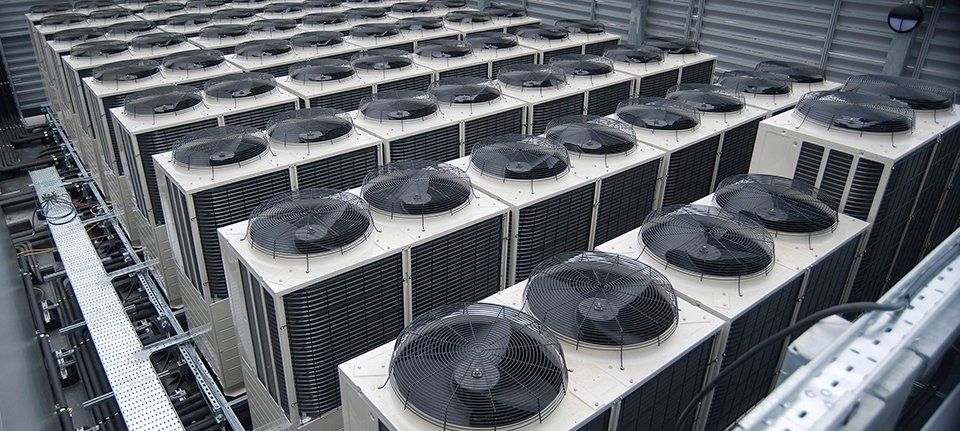HVAC Management: Everything You Need To Know

Heating, ventilation, and air conditioning (HVAC) are essential systems in any commercial building. They work together to provide a comfortable indoor environment year-round. Proper HVAC management is critical to ensuring these systems operate efficiently and effectively. Here’s everything you need to know about HVAC management, from the basics of how these systems work to best practices for keeping them running smoothly. How do HVAC systems work? HVAC systems work by circulating air throughout a building and controlling the temperature and humidity levels. Heating systems use a furnace to warm the air, while cooling systems use a refrigerator or air conditioner to cool the air. Ventilation systems work to circulate the air and remove any contaminants. The three systems work together to create a comfortable indoor environment. For example, the heating system might be used to warm the air on a cold day, while the cooling system may be used to cool the air on a hot day. What are the benefits of HVAC management? HVAC management is important for a number of reasons.
First, it can help improve the efficiency of your HVAC system, which can save you money on energy costs.
Second, it can help extend the life of your HVAC system by preventing wear and tear. And third, it can help ensure the indoor air quality in your building is good by removing any contaminants from the air. What are some best practices for HVAC management? There are a few best practices to follow when it comes to HVAC management.
First, you should have a regular maintenance schedule for your HVAC system. This might include having a professional come in to inspect and clean the system on a yearly basis. Second, you should make sure your HVAC system is the correct size for your building. An overly large system will waste energy, while an undersized system won’t be able to keep up with demand. And third, you should be aware of the different types of filters available for your HVAC system and make sure to use the right type of filter for your needs. For example, if you have allergies, you might want to use a HEPA filter to remove any allergens from the air. following these best practices can help improve the efficiency of your HVAC system and ensure a comfortable indoor environment year-round.
The Benefits of an HVAC Management System
An HVAC management system is a computerized system that controls the heating, ventilation, and air conditioning in a building. This system can be used to regulate temperature, humidity, and air quality. The benefits of an HVAC management system include improved comfort, energy savings, and better air quality. An HVAC management system can improve comfort by maintaining a consistent temperature throughout a building. This can be especially beneficial in large buildings with many rooms or in buildings that experience extreme temperatures. By maintaining a consistent temperature, an HVAC management system can help reduce drafts and hot spots. An HVAC management system can also help save money on energy bills. By controlling the heating and cooling of a building, an HVAC management system can help a building use less energy. In some cases, an HVAC management system can help a building reduce its energy consumption by up to 30%. Finally, an HVAC management system can also improve air quality. By controlling the ventilation in a building, an HVAC management system can help remove contaminants from the air. This can improve the air quality for people who work in the building or who live in the building.
The Various Types of HVAC Management Systems
If you are looking for a new HVAC management system, you may be wondering what your options are. Here is a look at the various types of HVAC management systems available on the market today:
1. Single-Zone Systems A single-zone system is the most basic type of HVAC management system. It is designed to control one zone of your home or office. If you have a small space that you need to heat or cool, a single-zone system may be a good option for you.
2. Multi-Zone Systems A multi-zone system is designed to control multiple zones of your home or office. If you have a large space that you need to heat or cool, a multi-zone system may be a good option for you.
3. Centralized Systems A centralized system is designed to control all of the zones of your home or office from one central location. If you have a large space that you need to heat or cool, a centralized system may be a good option for you.
4. Wireless Systems A wireless system is the latest type of HVAC management system. It uses wireless technology to control the zones of your home or office. If you have a large space that you need to heat or cool, a wireless system may be a good option for you.
The Differences Between Centralized and Decentralized HVAC Management
As a homeowner or business owner, you’ll need to make a decision on how you want to manage your HVAC system. There are two options available – centralized and decentralized. Here’s a look at the differences between the two: Centralized HVAC Management With centralized HVAC management, all of the controls for your system are located in one central location. This can be either in your home or office, or it can be at a remote location. The advantage of this type of system is that it’s easier to manage and control. You can make sure that all of the rooms in your home or office are being heated or cooled properly, and you can make adjustments as needed. However, the downside of centralized HVAC management is that it can be more expensive. If you have a large home or office, you’ll need to have a dedicated space for the central control unit. You’ll also need to have someone who is responsible for managing the system. Decentralized HVAC Management Decentralized HVAC management means that the controls for your system are located in each individual room. This can be a more expensive option, but it offers some advantages.
For example, you won’t need to have a dedicated space for the central control unit. And, each room can be set to a different temperature, so you can save energy by only heating or cooling the rooms that you’re using. The downside of decentralized HVAC management is that it can be more difficult to manage. You’ll need to make sure that each room is set to the correct temperature, and you’ll need to keep an eye on the temperature in each room to make sure that it doesn’t get too hot or too cold. When it comes to deciding between centralized and decentralized HVAC management, there are pros and cons to each option. It’s important to weigh the pros and cons carefully to decide which option is best for you.
The Importance of Monitoring and Maintenance in HVAC Management
If your business or home has an HVAC system, then you know how important it is to keep that system running smoothly. That’s where monitoring and maintenance come in. By keeping an eye on your system and performing regular maintenance, you can avoid costly repairs and keep your energy bills low. Here’s a closer look at the importance of monitoring and maintenance in HVAC management. Your HVAC system is made up of a lot of moving parts, which means there’s a lot that can go wrong. Monitoring your system can help you catch problems early, before they turn into expensive repairs. For example, if you notice your system isn’t heating or cooling your home as well as it used to, that could be a sign that something is wrong. By calling a technician to take a look, you can get the problem fixed before it gets worse. Regular maintenance is also important for keeping your HVAC system running smoothly. Just like your car, your HVAC system needs tune-ups and regular check-ups to ensure everything is working properly. This can help you avoid costly repairs down the road and keep your energy bills low. In fact, regular maintenance is often much cheaper than emergency repairs. So, if you want to keep your HVAC system in good shape, be sure to monitor it closely and schedule regular maintenance appointments. By doing so, you can avoid expensive repairs and keep your home or office comfortable all year long.
The Benefits of Energy Efficiency in HVAC Management
Heating, ventilation, and air conditioning (HVAC) systems are responsible for a large percentage of the energy use in commercial buildings. In fact, according to the U.S. Department of Energy, HVAC systems account for an estimated 40 percent of the total energy consumption in commercial buildings. energy efficiency is essential to reducing the operating costs of HVAC systems and improving the bottom line for businesses. Implementing energy efficiency measures can also help businesses meet their sustainability goals by reducing their carbon footprint. There are many ways to increase the energy efficiency of HVAC systems, including:
1. Regular Maintenance
2. Optimizing Airflow
3. Zoning
4. Installing Energy-Efficient Equipment
5. Automated Controls
1. Regular Maintenance Regular maintenance is essential to keeping HVAC systems running at peak efficiency. Some of the things that should be done during regularly scheduled maintenance include:
2. Optimizing Airflow Improving airflow is one of the most effective ways to increase the energy efficiency of HVAC systems. Poor airflow can lead to a number of problems, including:
3. Zoning Zoning is a way of dividing a building into different areas, each with its own temperature control. This can be an effective way to improve the energy efficiency of HVAC systems because it allows businesses to better control the temperature in individual areas.
4. Installing Energy-Efficient Equipment Installing energy-efficient equipment is another way to improve the energy efficiency of HVAC systems. When selecting new equipment, it is important to look for products that have earned the Energy Star label.
5. Automated Controls Automated controls can be used to optimize the operation of HVAC systems and improve energy efficiency. Automated controls can be used to schedule heating and cooling based on the needs of the business, and they can also be used to monitor and adjust the operation of HVAC equipment.
The Different Types of HVAC Controls
If you’re in the market for a new HVAC system, you may be wondering about the different types of HVAC controls available. Here’s a quick rundown of the most popular types of HVAC controls to help you make the best decision for your home or business.
1. Thermostats The most common type of HVAC control is the thermostat. Thermostats are used to regulate temperature in a space by turning the HVAC system on and off as needed. They can be manual or automatic, and can be controlled remotely via a smartphone app or other device.
2. Zoning Systems Zoning systems are a great way to save energy and money by only heating or cooling the areas of your home or business that are being used. Zoning systems use sensors to detect when someone is in a particular room or area, and will only heat or cool that space when needed.
3. Ventilation Controls Ventilation controls help regulate the amount of fresh air that’s brought into a space. This is important for maintaining good indoor air quality and preventing the build-up of stale air and odors. Ventilation controls can be manual or automatic, and can be used in conjunction with other HVAC controls like zoning systems.
4. Humidity Controls Humidity controls help maintain a comfortable indoor environment by regulating the amount of moisture in the air. Too much humidity can lead to the growth of mold and mildew, while too little humidity can cause dry skin and respiratory problems. Humidity controls can be integrated into thermostats or used as standalone units.
5. Air Filtration Systems Air filtration systems help remove airborne contaminants from the air, providing clean air for your family or employees. Air filtration systems are available in a variety of sizes and types to suit any space, and can be used in conjunction with other HVAC controls for maximum efficiency.
6. Maintenance Plans Most HVAC manufacturers offer maintenance plans that help keep your system running smoothly and efficiently. Maintenance plans typically include regular inspections and tune-ups, and can help catch small problems before they become big ones. HVAC controls are an important part of any HVAC system, and there are a variety of options to choose from. Be sure to consult with a qualified HVAC contractor to find the best solution for your home or business.



